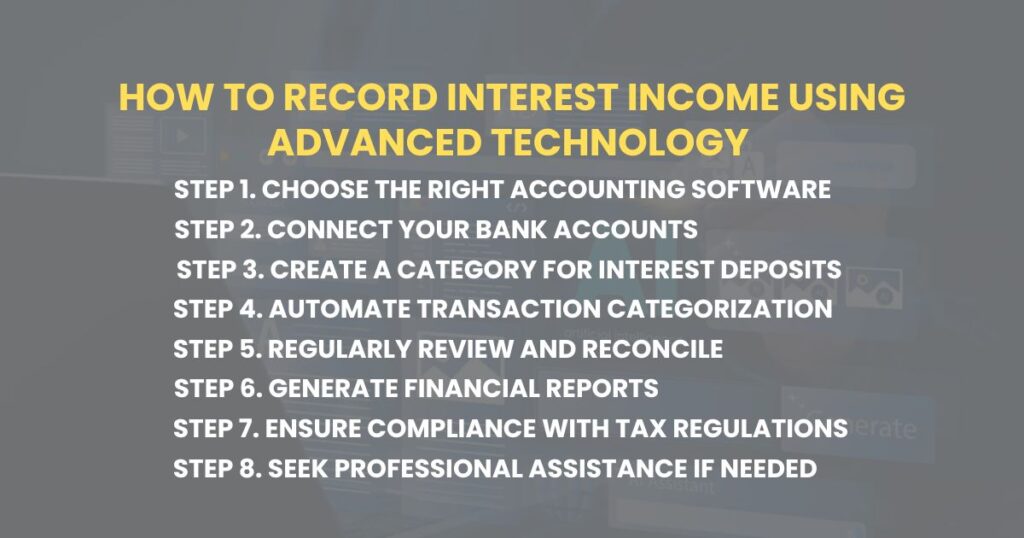Understanding the Importance of Accurate Bookkeeping for Interest Income
Accurate bookkeeping is crucial for any business, as it helps maintain financial health and ensures regulatory compliance. One key aspect of bookkeeping is managing the interest deposited in business accounts. The phrase “interest Income category for book bookkeeping services” means working and classifying the interest income from savings or investment accounts. Correctly categorizing this income keeps your financial records in check and plays a significant role in managing cash flow and ensuring that your financial statements are accurate. For small businesses, understanding and correctly categorizing this aspect can help streamline tax time and provide clarity in business operations.
Managing interest income effectively requires a detailed approach. Many businesses miss this detail, resulting in errors in financial records and possible tax problems. Using advanced accounting software, business owners can ensure that interest income is categorized correctly, helping with tax returns and day-to-day financial management. The IRS Publication 535 provides guidelines on handling such income, emphasizing the importance of precise categorization. Whether you are managing office expenses, business travel costs, or employee benefits, knowing how to assign a category to all transactions, including interest income, is vital for comprehensive financial oversight.
What is Interest Income?
Interest Income is the money you earn from accounts that generate interest, like savings accounts, CDs(Certificates of Deposit), or investment portfolios. This type of income, categorized under “other income” in most accounting software, is essential for maintaining accurate financial records. It directly impacts cash flow and financial reporting, influencing how a business prepares for tax time and manages its overall financial strategy.
Grasping and handling interest income is essential for several important reasons. Firstly, it ensures accurate financial reporting, which is vital for making informed business decisions. Secondly, correctly categorizing interest income helps businesses comply with tax regulations, preventing potential penalties for inaccurate reporting. Accurately monitoring interest deposits helps companies improve their financial oversight, better manage cash flow, and align their economic plans with broader objectives.
How to Record Interest Income Using Advanced Technology
Keeping track of interest income correctly is essential for accurate financial records and meeting tax requirements. Advanced technology can streamline this process, reduce errors, and enhance financial management. Here’s a step-by-step guide on how to effectively record interest deposits using modern accounting technology:

Step 1. Choose the Right Accounting Software
Choose accounting software that fits your business requirements. Popular options include QuickBooks, Xero, and FreshBooks, which offer features for tracking and categorizing various types of income, including interest. Ensure the software can connect directly to your bank accounts to import transactions automatically.
Step 2. Connect Your Bank Accounts
Connect your bank accounts with your accounting software. This integration allows the automatic import of bank transactions, including interest deposits. Linking your accounts helps ensure that every transaction is accurately recorded and lowers the chance of mistakes from manual entry.
Step 3. Create a Category for Interest Deposits
Set up a specific category for interest income in your accounting software. Typically, this category is listed under “Other Income” or a comparable section in your accounting software. Creating a dedicated category helps accurately track and report interest deposits.
ALSO READ THIS: What is Bookkeeping? Definition & Types
Step 4. Automate Transaction Categorization
Use the automation features of your accounting software to categorize interest deposits. Today’s advanced systems can automatically sort transactions into the correct categories using predefined rules. Create automated rules to classify interest income, which saves time and keeps your records consistent.
Step 5. Regularly Review and Reconcile
Consistently check and match your interest deposit records against your bank statements. Reconciliation helps ensure that all interest deposits are accurately recorded and discrepancies promptly addressed. Most accounting software offers reconciliation tools to simplify this process.
Step 6. Generate Financial Reports
Use your accounting software’s reporting tools to create financial statements showing interest deposits. These reports give you a clear view of your financial health and help prepare your taxes. Regularly generating and reviewing reports helps maintain transparency and make informed business decisions.
Step 7. Ensure Compliance with Tax Regulations
Ensure that your interest deposits are reported correctly in compliance with tax regulations. Advanced accounting software often includes tax compliance features that help you track taxable interest income and prepare for tax filings. If needed, seek guidance from a tax expert to guarantee your reporting is correct.
Step 8. Seek Professional Assistance if Needed
If managing interest deposits becomes complex, consider seeking help from professional bookkeeping or accounting services. Professionals can provide expertise in handling complex transactions and ensure accurate financial reporting.
If you find managing interest deposits challenging, consulting a professional can help ensure everything is handled accurately. Now, let’s move on to how to effectively categorize these deposits to keep your financial records accurate and organized.

How to Effectively Categorize Interest Income
Correctly organizing interest income in your bookkeeping system is essential for keeping your financial records accurate and meeting tax rules. Effective categorization helps in better financial management and decision-making. Here’s a straightforward guide to assist you in handling interest deposits efficiently:
1. Identify the Source
The first step in categorizing interest deposited is to identify the source of the income. Interest can be earned from different financial sources, like savings accounts, CDs(Certificates of Deposit), or various investments. Understanding where your interest income originates helps in accurately recording and categorizing it.
- Savings Accounts: These accounts typically provide a small, consistent interest rate. Interest earned from savings accounts should be recorded under the appropriate category in your bookkeeping system.
- Certificates of Deposit (CDs): Certificates of Deposit (CDs) usually provide better interest rates and come with set terms. Interest earned from CDs should be tracked separately to ensure accurate financial reporting.
- Investments: Interest from investments, such as bonds or mutual funds, can vary and may need specialized categorization depending on the type of investment.
2. Create a Category in Your Accounting Software
After figuring out where your interest income comes from, setting up a dedicated category in your accounting software is next. Most accounting platforms, such as QuickBooks, Xero, or FreshBooks, allow you to set up custom categories for various types of income.
- Set Up a Category: Create a category labelled “Interest Income” or a similar name under the “Other Income” section. Setting up a category helps organize your financial records and ensures that interest income is tracked separately from other revenue streams.
- Consistency: Use the same category for all interest income to maintain consistency in your financial records. Consistency simplifies reporting and makes it easier to analyze your financial performance.
3. Record Transactions Accurately
Properly tracking interest income is crucial for maintaining clear financial statements and meeting tax obligations. Record every interest deposit in your bookkeeping system, assigning it to the correct category.
- Enter Transactions: When recording interest deposits, input the amount, date, and source of the income into your accounting software. Make sure to label the transaction under the “Interest Income” category.
- Verification: Double-check that all interest deposits are recorded correctly and that no transactions are missed. Accurate entry helps prevent errors in your financial reports and tax filings.
ALSO READ THIS: Taxing Company That Outsource For Startups
4. Conduct Regular Reviews
Regularly reviewing your financial statements is crucial for maintaining accuracy in your bookkeeping. Reviewing helps ensure that interest income is consistently and correctly recorded.
- Review Statements: Periodically review your financial statements and transaction records to verify that interest deposits are accurately categorized. These statements make it easier to spot mistakes or inconsistencies early.
- Adjustments: Make necessary adjustments if you find any mistakes or inconsistencies. Regular reviews contribute to better financial management and accurate reporting.
Consistently checking your financial records helps keep them accurate and current. By catching discrepancies early, you pave the way for precise reporting. However, if managing interest deposits becomes overwhelming or complex, seeking professional help can provide an extra layer of assurance. Professional bookkeeping services offer specialized knowledge that simplifies these challenges and enhances accuracy in managing interest deposits. Let’s explore how leveraging their expertise can significantly benefit your business.
Benefits of Professional Bookkeeping Services for Managing Interest Income
Managing interest deposited in your business’s financial records may look simple, but it can be challenging. Professional bookkeeping services offer significant advantages in handling this crucial aspect of economic management. Here’s how leveraging professional expertise can benefit your business:
1. Expertise and Accurate Management
Professional bookkeepers offer deep expertise in managing interest income. They ensure that all interest deposits are recorded correctly, using advanced techniques and accounting software to provide precise categorization. Expertise and Accurate Management reduce errors and align with best practices crucial for accurate financial statements.
2. Time-Saving Efficiency
Delegating your bookkeeping tasks lets you concentrate on growing your business. Professionals handle all aspects of managing interest income efficiently, freeing up your time to focus on core activities and strategic growth.
3. Enhanced Accuracy and Tax Compliance
Expert bookkeepers keep your financial records precise and current, helping to reduce mistakes. They also stay informed about the latest tax regulations, ensuring that your interest income is reported correctly, which helps avoid potential tax penalties.
Getting professional help ensures your financial records are accurate and comply with regulations, creating a solid base for managing your finances effectively. However, even with the best systems, you still face challenges when managing interest deposits. Let’s explore how to overcome common issues and make the process smoother, from handling multiple accounts to navigating fluctuating interest rates and diverse financial products.

Overcoming Common Challenges in Managing Interest Income
1. Coordinating Interest from Multiple Accounts
When you have interest coming from various accounts, it can be tricky to keep track. Using a unified accounting system that combines all your account details in one place will make monitoring and managing your interest income easier without missing anything.
2. Adjusting to Fluctuating Interest Rates
Interest rates are not always the same and can change over time. To keep your records accurate, use accounting tools that allow you to update interest rates as they change. This way, your financial records will always reflect the current rates.
3. Managing Different Financial Products
Interest from different financial products can be calculated in various ways. Choosing accounting software that can handle these different types of interest will help you accurately record and categorize each type of interest income.
4. Tracking Investment Income
Interest from investments can be more complicated due to varying returns. Work with financial experts to understand how to record this income correctly. Make sure your accounting software can track investment income in detail.
5. Staying Compliant with Tax Laws
Accurately tracking interest income is crucial for handling your taxes correctly. Be aware of tax regulations and use resources like IRS Publication 535 to ensure you report interest income correctly. Expert bookkeeping services can ensure you meet regulatory requirements and help you avoid fines.
These tips will help you tackle the challenges of managing interest deposited, making your bookkeeping smoother and more reliable.
VISIT: Bookkeeping Services in Texas
Final Thoughts
In conclusion, accurately managing deposited interest is vital for clear financial records and tax compliance. Correctly categorizing this income, handling various interest rates, and managing multiple accounts can be streamlined with professional bookkeeping services. These professionals bring accuracy and efficiency, ensuring your records are precise and compliant with regulations. Managing interest income helps small businesses maintain a healthier cash flow and financial stability.


